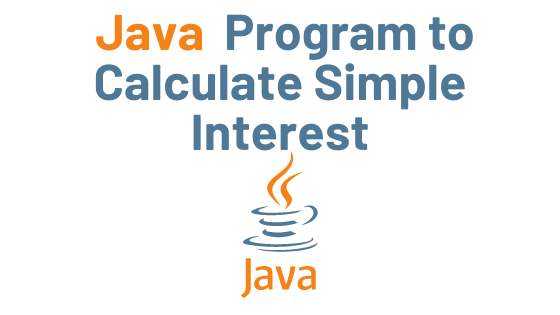In this tutorial, we will write a Java program that will calculate simple interest.
Simple Interest Formula
Simple Interest = (P × R × T)/100
- P is Principal amount.
- R is rate per annum.
- T is time in years.
For example, suppose a man deposits 2000 INR in a bank account at a 6% annual interest rate for three years. Calculate the simple interest at the end of three years.
Simple interest = 2000*6*3/100 = 360 INR
Example:
In the following example, we take the user’s p, r, and t values and then calculate simple interest based on those values.
public class JavaExample
{
public static void main(String args[])
{
float p, r, t, sinterest;
Scanner scan = new Scanner(System.in);
System.out.print("Enter the Principal : ");
p = scan.nextFloat();
System.out.print("Enter the Rate of interest : ");
r = scan.nextFloat();
System.out.print("Enter the Time period : ");
t = scan.nextFloat();
scan.close();
sinterest = (p * r * t) / 100;
System.out.print("Simple Interest is: " +sinterest);
}
}
Output:
Simple Interest with Example Simple Interest with Example Simple Interest with ExamplevSimple Interest with ExampleSimple Interest with Example Simple Interest with Example v Simple Interest with Example
Enter the Principal : 2000
Enter the Rate of interest : 6
Enter the Time period : 3
Simple Interest is: 360.0
Annotations in Java are used to provide metadata for your Java code. Because they are metadata, Java annotations do not directly affect the execution of your code, though some types of annotations can. Java annotations were introduced in Java 5 and are still in use today. Annotations in Java are used to provide metadata for your Java code. Because they are metadata, Java annotations do not directly affect the execution of your code, though some types of annotations can. Java annotations were introduced in Java 5 and are still in use today. Annotations in Java are used to provide metadata for your Java code. Because they are metadata, Java annotations do not directly affect the execution of your code, though some types of annotations can. Java annotations were introduced in Java 5 and are still in use today. Annotations in Java are used to provide metadata for your Java code. Because they are metadata, Java annotations do not directly affect the execution of your code, though some types of annotations can. Java annotations were introduced in Java 5 and are still in use today. Annotations in Java are used to provide metadata for your Java code. Because they are metadata, Java annotations do not directly affect the execution of your code, though some types of annotations can. Java annotations were introduced in Java 5 and are still in use today. Annotations in Java are used to provide metadata for your Java code. Because they are metadata, Java annotations do not directly affect the execution of your code, though some types of annotations can. Java annotations were introduced in Java 5 and are still in use today. Annotations in Java are used to provide metadata for your Java code. Because they are metadata, Java annotations do not directly affect the execution of your code, though some types of annotations can. Java annotations were introduced in Java 5 and are still in use today. Annotations in Java are used to provide metadata for your Java code. Because they are metadata, Java annotations do not directly affect the execution of your code, though some types of annotations can. Java annotations were introduced in Java 5 and are still in use today. Annotations in Java are used to provide metadata for your Java code. Because they are metadata, Java annotations do not directly affect the execution of your code, though some types of annotations can. Java annotations were introduced in Java 5 and are still in use today. Annotations in Java are used to provide metadata for your Java code. Because they are metadata, Java annotations do not directly affect the execution of your code, though some types of annotations can. Java annotations were introduced in Java 5 and are still in use today.



